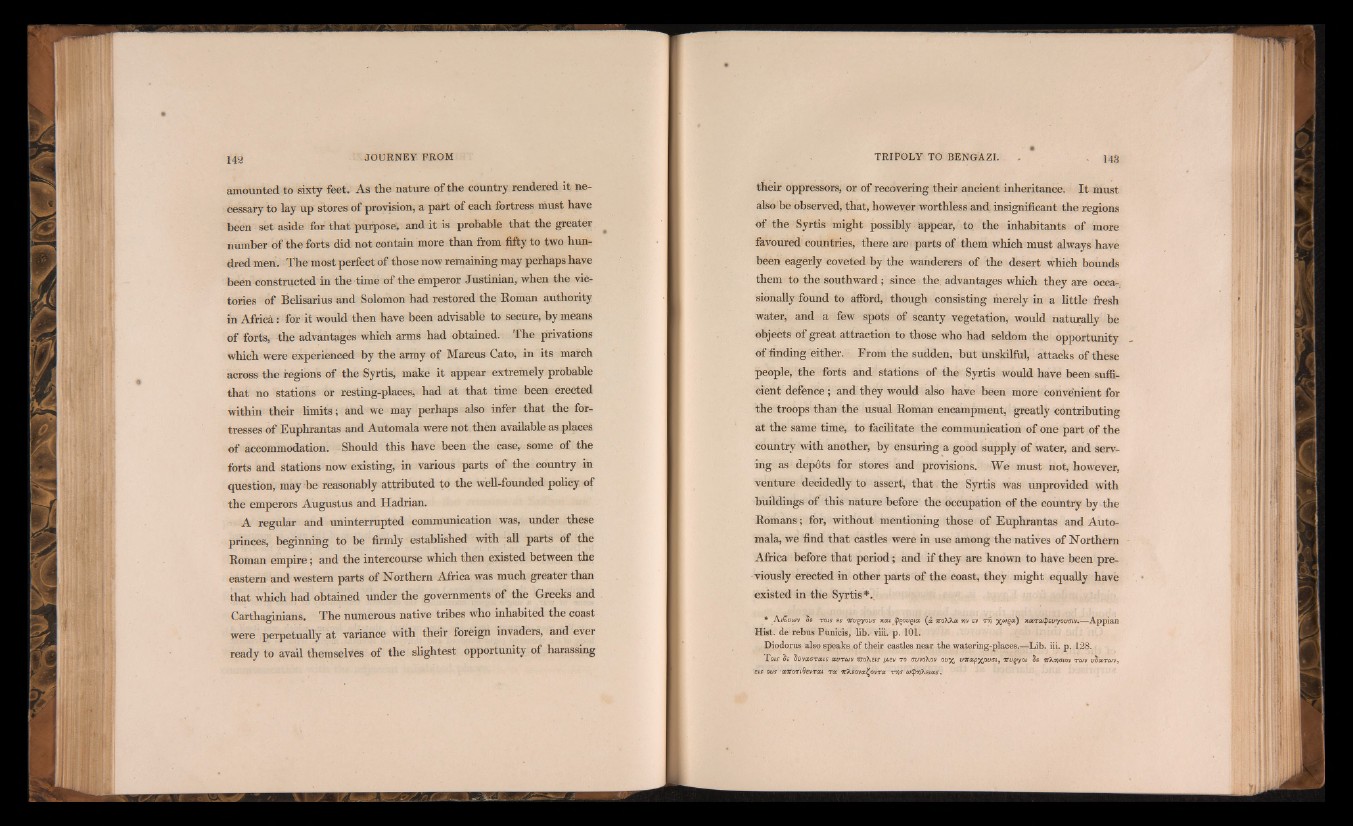
amounted to sixty feet. As the nature of the country rendered it necessary
to lay up stores of provision, a part of each fortress must have
been set aside for that purpose, and it is probable that the greater
number of the forts did not contain more than from fifty to two hundred
men. The most perfect of those now remaining may perhaps have
been constructed in the time of the emperor Justinian, when the victories
of Belisarius and Solomon had restored the Roman authority
in Africa: for it would then have been advisable to secure, by means
of forts, the advantages which arms had obtained. The privations
which were experienced by the army of Marcus Cato, in its march
across the regions of the Syrtis, make it appear extremely probable
that no stations or resting-places, had at that time been erected
within their limits; and we may perhaps also infer that the fortresses
of Euphrantas and Automala were not then available as places
of accommodation. Should this have been the cane, some of the
forts and stations now existing, in various parts of the country in
question, maybe reasonably attributed to the well-founded policy of
the emperors Augustus and Hadrian.
A regular and uninterrupted communication was, under these
princes, beginning to be firmly established with all parts of the
Roman empire; and the intercourse which then existed between the
eastern and western parts of Northern Africa was much greater than
that which had obtained under the governments of the Greeks and
Carthaginians. The numerous native tribes who inhabited the coast
were perpetually at variance with their foreign invaders, and ever
ready to avail themselves of the slightest opportunity of harassing
their oppressors, or of recovering their ancient inheritance. I t must
also be observed, that, however worthless and insignificant the regions
of the Syrtis might possibly appear, to the inhabitants of more
favoured countries, there are parts of them which must always have
been eagerly coveted by the wanderers of the desert which bounds
them to the southward ; since the advantages which they are occa-,
sionally found to afford, though consisting merely in a little fresh
water, and a few spots of scanty vegetation, would naturally be
objects of great attraction to those who had seldom the opportunity
of finding either. From the sudden, but unskilful, attacks of these
people, the forts and stations of the Syrtis would have been sufficient
defence ; and they would also have been more convenient for
the troops than the usual Roman encampment, greatly contributing
at the same time, to facilitate the communication of one part of the
country with another, by ensuring a good supply of water, and serving
as dépôts for stores and provisions. We must not, however,
venture decidedly to assert, that the Syrtis was unprovided with
buildings of this nature before the occupation of the country by the
Romans ; for, without mentioning those of Euphrantas and Automala,
we find that castles were in use among the natives of Northern
Africa before that period ; and if they are known to have been previously
erected in other parts of the coast, they might equally have
existed in the Syrtis*.,
* AtCuwv Se t o is es Wuqyous nai (pçouçia ( a iroKka *jv ev ttj %«§«) xamupet^ouffiviiPr Appian
Hist, de rebus Punicis, lib. viii. p. 101.
Diodorus also speaks of their castles near the watering-places.—Lib. iii. p. 128.
T o îy Se Svvaarais ceuraiv zjoKeis /xev t o otfvoXov ot/jç uitxpypuai, itvçryoi irKnoiov ruv vSxruv,
sis ovs ■a'JSoriQevrou va TtXeova^ovva wis wtyviheias.